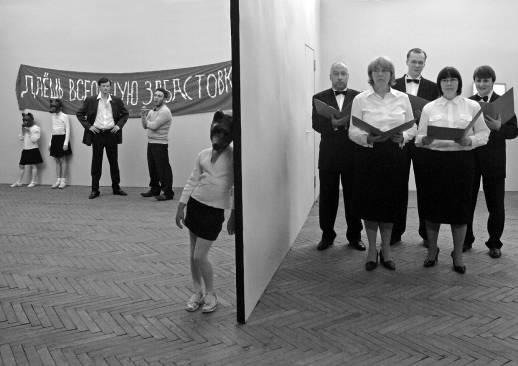Chto Delat?
dal 21/1/2011 al 12/3/2011
Segnalato da
21/1/2011
Chto Delat?
Smart Project Space, Amsterdam
For their new exhibition at SMART Project Space, 'What is to be done Between Tragedy and Farce?', Chto Delat? map the complexity of Russia's political and social context in the form of a comprehensive programme consisting of spatial installations, performances, lectures, film screenings, publications, and workshops. They have constructed a critical reflection of Russian reality for the viewer through a series of wall drawings that seek to explain why they continue to oppose the current development of the country and the mode of governance.

Join us at SMART Project Space for the first in a new series of commissioned exhibitions by the Russian collective Chto Delat? (What is to be done?). Chto Delat? has been active since 2003 and is composed of artists, philosophers, and writers with a leftist position on economic, social and cultural agendas . Their diverse activities merge cultural knowledge and the production of art with activism and political theory.
The universal question “What is to be done?” historically marks the position of the left in merging tactics and strategy of their politics, whilst matching intellectual ideas and everyday practical work. The answers are always locally and historically conditioned. For their new exhibition at SMART Project Space, “What is to be done Between Tragedy and Farce?,” Chto Delat? map the complexity of Russia’s political and social context in the form of a comprehensive programme consisting of spatial installations, performances, lectures, film screenings, publications, and workshops.
This is the first time they have set this task upon themselves, deciding to work with an enormous and chaotic database of information that represents Russian reality. Oil production figures, records of homeless people, tax revenues and levels of wages, numbers of murders and birth rates, the growth of inequality and the military-industrial complex, the index of xenophobia and depopulation, and the list goes on and on.
In her recent article on Chto Delat?, Elena Filipovic writes of the collective’s double role as “representing a certain history while overcoming common preconceptions in order to act as international translators”.
They have constructed a critical reflection of Russian reality for the viewer through a series of wall drawings that seek to explain why they continue to oppose the current development of the country and the mode of governance.
In the first three rooms, a representation is shown on the situation in Russia and how it has changed over the last 10 years – a crucial decade in the life of the young nation state. The first concentrates on the different factors of formal and official growth in all possible spheres of economy, politics and everyday life. The second shows different forms of conflicts based on real cases taken from recent social and political life. The third focuses on the human dimension of the transformation, trying to raise the issue of possible scenarios for the future.
The fourth exhibition space is dedicated to the Songspiel Trilogy, which is shown together for the first time with some objects that served as props for previous Chto Delat? films. Additionally, key films realized by Chto Delat? between 2003 and 2009 will be shown alongside wooden panels showcasing fragmented print-outs from the pages of their newspaper publication from different years. A reading room is also integrated into the exhibition to show all Chto Delat? publications and a selection of books that collective members have recommended.
The last space in the show is constructed as a workshop conceived by Gluklya (Natalia Pershina). The collection of clothes on view represents the outcome of participatory workshops, The Shop of Utopian Clothes, run with different social groups in St. Petersburg. Through this collective artistic work, the realities of these often under-represented individuals of St. Petersburg society are given empowerment. Through the course of the exhibition, a similar workshop will be conducted with members of local migrant communities, adding a new dimension to the piece. It is meant to create a dialogue around the migrant situation in The Netherlands and address the needs and problems of those whose lives are affected by it.
An integral work entitled 48 Hour Communal Life Seminar: Where has Communism Gone? takes place at the beginning of February, which culminates in the public staging of a Lehrstück ‘play for learning’ under the same title, that sets out to examine the current climate in politics and utopian potential.
Chto Delat? are present in Amsterdam for the entire duration of the exhibition – turning SPS into a platform for discourse, research and debate.
The project at SPS is realised by: Tsaplya (Olga Egorova), Nikolay Oleynikov, Gluklya (Natalya Pershina-Yakimanskaya) and Dmitry Vilensky. www.chtodelat.org
For interviews, more information, video and photo material, please contact Una Henry, Tel +31 (0)20 427 59 51 or e-mail una@smartprojectspace.net
In case of publication please mention: www.smartprojectspace.net
Opening Saturday 22 January 2011, 19hrs
SMART Project Space
Arie Biemondstraat 111, 1054 PD Amsterdam



